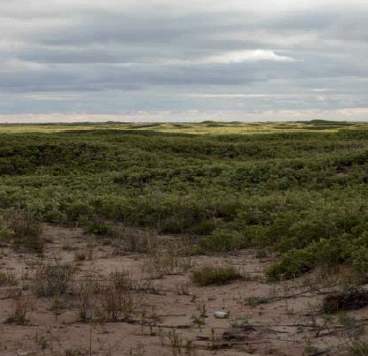Cute little guy, isn’t he?
Well, for a lizard. He’s also known as the Dunes Sagebrush Lizard; this endearing little critter is native to the American Southwest. Specifically, eastern New Mexico and West Texas. This is what the lizard’s preferred habitat looks like:
Notice what’s missing? Oil derricks. You see, the favored habitat of the Dunes Sagebrush Lizard also happens to be a favored habitat of the Domestic Production Crude Oil Rig: the US Fish and Wildlife Service plans to declare the former to be an endangered species, and you know just how this story ends, right?
Yup, you do: it ends with one of our most productive energy-producing regions getting shut down over a three-inch lizard. I hand this over to Michael Williams, who is incidentally running for Senator in Texas – [and who is] somebody who knows something about Texan energy policy:
The Permian Basin in West Texas is currently the largest oil play in the United States today, producing more than 268 million barrels of oil in 2010. At the current price of $112 per barrel, that’s more than $30 billion worth of oil, or 74% of Texas’ production. And that’s just for the crude, not accounting for the tens of thousands of jobs and billions of dollars to our economy related to oil and gas production, including oilfield service, pipelines, and other industries.
Texas remains the number one producer of oil and natural gas in the country. The sand dune lizard lives in the heart of the oil and natural gas rich Permian Basin. Applying federal endangered species protection to the sand dune lizard will kill jobs and paralyze Texas production activities precisely when Texans are looking at $4.00 gasoline, which could rise even higher. If I didn’t know better, I’d think President Obama is actually trying to see what $5 gasoline looks like.
Mike’s fibbing there: he knows, I know, and probably you know darn well that President Obama does want to see what $5 gasoline looks like, because President Obama is an urban liberal who is fundamentally unfamiliar with the direct consequences of expensive fuel. Even if he wasn’t unfamiliar, it’s unlikely that he’d care much. Making gas expensive is generally thought of as a, well, sneaky way to transform American societal habits; that one of those transformations might be to stop reflexively voting for Democrats has not yet sunk in. Which sounds great, until you realize that our energy production will still end up taking a severe hit.
Look, people do like critters. I like critters. But this is the delta smelt problem all over again – and, frankly? The needs AND WANTS of human beings come first. I’d rather have cheap vegetables than the delta smelt. I’d rather have cheap gas than the sand dune lizard. If it’s a choice between my species being hungry, cold, and in the dark, and some other animal species… well. I guess that they should have evolved faster.
And I can’t help but notice that every politician and activist who seems comfortable with putting ‘animal rights’ above human ones have one thing in common; none of them are Republicans…
Moe Lane (crosspost)
[Edited for clarity.]



So if Texas told the U.S. Fish and Wildlife Service to go screw, what could be done about it? Considering they seem to be one of the few states with a not so crummy economy, I would think the feds would hesitate to retaliate. Be some interesting fireworks if it did happen. Shame it won’t.
And none of those liberals actually seem to believe in evolution of species or adaptation.